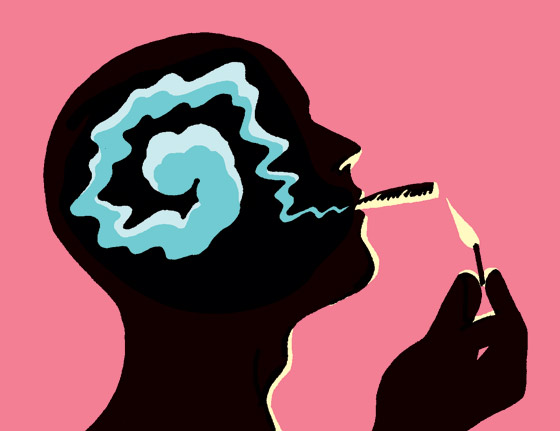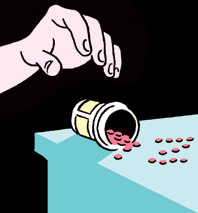
Why does everyone suddenly seem to have celiac disease? I get frequent stomachaches. Should I be worried?
You’re not imagining things—celiac really is on the rise, says Mark Pochapin, director of gastroenterology at NYU Langone Medical Center. Celiac is four times more prevalent today than in the fifties. “And it’s not just that we’re diagnosing more of it, which we are—but it’s probably occurring more often, too,” Pochapin says. Celiac disease is an immune reaction to the protein gluten—which is found in bread, pasta, and other foods containing wheat, barley, or rye—that results in the shortening of the villi, tiny hairs in the intestine that aid in absorbing nutrients. The condition is genetic, and if you’ve inherited it, you might experience symptoms as mild as bloating or as severe as diarrhea, weight loss, and fatigue when you eat gluten. Doctors cite several possible reasons for the increased occurrence of the condition. One theory—the “hygiene hypothesis”—says we’re simply growing up in too clean an environment and developing a hyperimmune reaction to foods with gluten.
If your doctor suspects you have celiac, she’ll likely perform an endoscopy—that’s sending a tiny tube down your throat and into your intestine to take a sample of those little hairs—and perhaps a genetic test. If the results are negative, you definitely don’t have celiac and instead may simply have a gluten allergy. Celiac can’t be cured, and if left untreated the condition can lead to nutritional deficiencies that can cause serious health problems. In most people, however, celiac (and gluten allergies) can be managed simply by eating a gluten-free diet, which a qualified nutritionist can help you formulate.
With everything that’s now known about concussions, would I be crazy to let my kids play football or hockey?
You’re smart to take the risk of concussions seriously, but keep it in context, says brain-injury expert Steven Flanagan, chair of the Department of Rehabilitation Medicine at NYU Langone Medical Center. Flanagan notes that there’s no definitive proof yet that concussions caused the mental-health issues we’ve seen in athletes like former NFL star Junior Seau and NHL player Derek Boogard. To strike a balance between sense and safety, he says, ask the league organizers or school officials in question about their concussion policies. These days, you should get a thorough, carefully thought-out answer; awkward silence is a bad sign. Make sure coaches know what a concussion is and how to recognize the signs of one (symptoms include dizziness, nausea, or trouble concentrating), and be sure all safety equipment is up-to-date. Any child who displays concussion symptoms should be evaluated by a qualified doctor before he or she is cleared to play again, and anyone who suffers multiple concussions should be treated with extra caution. The aim is to be prudent but not overprotective. “There are too many social and health benefits from playing a sport to just opt out,” says Flanagan.
I know some people swear running barefoot, or with those five-separate-toes shoes, is better for you than running in traditional sneakers. But, really? In New York?
The inspiration for barefoot running came from African runners, some of whom have run barefoot all their lives, says Mario Nelson, a physical medicine and rehabilitation specialist at Montefiore Medical Center. Those in favor of barefoot running say it can alter the way your foot strikes the ground, putting the impact toward the toes rather than the heel, which is believed to reduce wear and tear on your feet and joints. “Personally, I don’t buy it,” Nelson says. “Why should you deprive yourself of the benefits of a shoe?” Not only do sneakers protect your feet against the environment—snow, potholes, dirt, broken glass—but they also provide support during standing, walking, and running, and can compensate for any biomechanical shortcomings of your feet, Nelson says. Everyone’s feet are biomechanically different and need adjustment to be properly aligned; a sports-medicine doctor or physical therapist can examine you and tell you what to look for in a running shoe. If you’re flat-footed, for example, you might need arch support, lest the problem show up later in your back later. “I have plenty of patients in their fifties with low back pain because that issue wasn’t addressed when they were teenagers,” says Nelson. “In short, barefoot running isn’t good for anyone. Stick with those sneakers.”

I’m 45 and smoked a lot of pot when I was younger. I’ve only rarely partaken in the last decade, but how worried should I be about the residual health effects?
When you smoke pot, of course, you may experience poor coordination, difficulty with thinking and problem-solving, and trouble with learning and memory. “And obviously it feeds into the brain’s reward circuits,” says Marianne Legato, an internist at New York–Presbyterian/Columbia University Medical Center and St. Luke’s–Roosevelt Hospital Center. “I shop; other people use marijuana.” If you smoke regularly, you’re likely functioning at a suboptimal intellectual level all the time, and these changes persist as long as you continue using the drug. The research on long-term fallout, however, is inconclusive. While some studies have linked regular cannabis use to permanent cognitive effects, a large 2011 study suggested the drug’s impact on the brain was reversible. As for your lungs, inhaling marijuana is clearly associated with coughing and wheezing, and long-term use has been linked with respiratory damage (a link to respiratory cancers is unclear). Legato advises caution. “Chronic substance use has an effect. To think that a joint, if you’re going to smoke all the time, doesn’t have an impact—you’re kidding yourself.”
I know I’m supposed to wear sunscreen and cover myself from head to toe like a Bedouin when I go outside, but now there’s all this concern about vitamin-D deficiency. So, sun or no sun?
Sun is acceptable, but only with proper precautions, says Desiree Ratner, director of New York–Presbyterian/Columbia’s melanoma center. “There isn’t any scientifically validated ‘safe’ level of UV exposure that doesn’t increase skin-cancer risk,” Ratner says. She stresses the basics: Always wear skin-covering clothing, or apply sunscreen every two to three hours. “It needs to be broad spectrum, meaning that it blocks both UV and UVA rays, SPF 30 or higher.” Here’s the catch: If you follow that advice or, worse, avoid sun exposure altogether, you may inhibit your body’s ability to manufacture vitamin D. Doctors have become increasingly interested in vitamin-D deficiency; the vitamin is needed to maintain bone health and may even help reduce the risk of MS and cancer. So what to do? Over-the-counter vitamin-D supplements are widely available, but there is disagreement about their usefulness. The American Academy of Dermatologists recommends that you derive your vitamin D from dietary sources. Foods that are rich with it include fatty fish like salmon and tuna, egg yolks, Swiss cheese, and fortified milk, orange juice, yogurt, and breakfast cereals.

Which is better: not getting any sleep ever or taking sleeping pills every night?
“Both are bad,” says Lenox Hill Hospital internist Stuart Orsher. Insomnia can cause problems ranging from overeating and weight gain to muscle pain and depression. Frequent sleeping-pill use can not only lead to addiction but can also mask a more serious medical problem. Worse, “if you have a thyroid condition or a respiratory problem that’s keeping you awake, sleeping pills could sedate you and have extra negative effects,” Orsher says. Before trying pills, and after you see your doctor to rule out any underlying conditions, try natural solutions first. Cut back on carbs, sugar, and caffeine close to bedtime, keep your bedroom dark, quiet, and free of distractions, and so on. If that doesn’t work, an occasional sleeping pill, over-the-counter or prescription, is probably fine. But if you find yourself relying on pills to fall asleep more than a couple days in a row, see your doctor to help you break the habit.